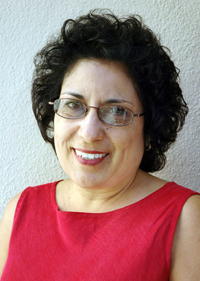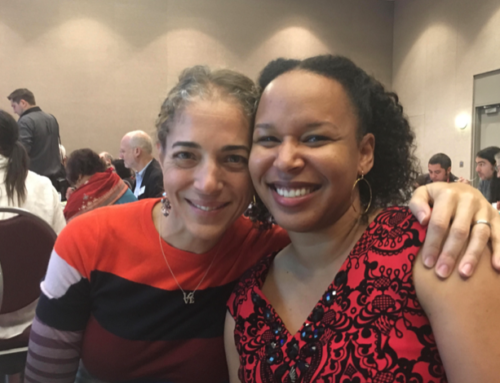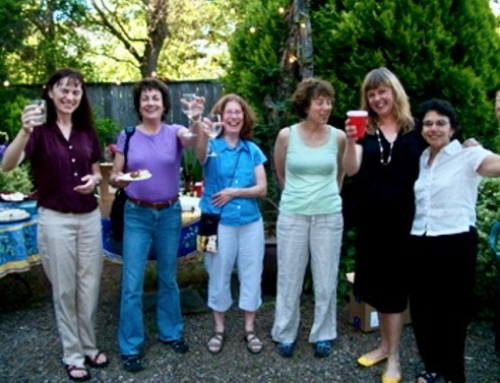In mid-2019 I was in a series of meetings at the School for Advanced Research with Pat Zavella to discuss a collaborative project focused on contemporary Latinx dissent. Along with other colleagues, we considered important threads that connected our work, which ranged from testimonios, public art, trans-community family formation, witnessing and immigration court advocacy, and, of course, Pat’s most recent work on reproductive justice activists. In addition to her critical eye and pointed recommendations to each of us, Pat also focused on the way we were all, in important ways, grounded in a kind of work that was rooted in accompanying. That is, our collective understanding of how to “do anthropology” had everything to do with walking with our interlocutors. Rather than research subjects, they were colleagues, friends, maybe even family. Instead of dictating the terms of analysis, we actively sought insights and feedback from people who formed the core of our work. This became key to understanding our individual and collective work. And it is, indeed, key to understanding Pat’s work and contributions. Through her writing, her feminist perspective, her mentoring, and her way of creating community, she has modeled critical ethnography and radical care. She has guided and accompanied many in their efforts to do similarly.

Patricia Zavella
Pat’s contributions to a critical feminist scholarship and to anthropology in general are immense. Her perspective is one that centers Latina lives and struggles. She has consistently challenged us to reexamine the everyday ways that Latina working-class women structure their work and families, enact critical carework, and develop forms of dissent. At the core of this analysis is a centering of intersectionality. Her theorizing on the ways in which race, class, and gender intersect to create particular conditions for Latinas, and on the ways Latina laborers and organizers attempt to address these has influenced the work of generations of scholars.
Even a cursory review of her work reveals ways that her scholarship has profoundly informed others – particularly but not only those working within Anthropology, Latinx Studies, American Studies, and Gender Studies. Her first book, Women’s Work and Chicano Families: Cannery Workers of the Santa Clara Valley (1987), is a pioneering ethnographic monograph that utilized a feminist theorizing of political economy and centered participants’ narratives. Pat’s pathbreaking work is also reflected in a number of influential articles, including “Feminist Insider Dilemmas,” published in Frontiers (1993), cited widely by scholars interested in exploring and engaging with questions of the politics of identity and research. Her two most recent publications – I’m Neither Here Nor There: Mexicans’ Quotidian Struggles With Migration and Poverty (2011) and The Movement for Reproductive Justice: Empowering Women of Color Through Social Activism (2020) – represent her tireless dedication to ethnographic research that foregrounds the experiences of Chicanas and Mexican migrants both within the United States and transnationally. A prolific scholar and mentor to many, her work has an immeasurable reach. In 2003 she received the National Association for Chicana and Chicano Studies Scholar of the Year Award for her distinguished contributions to activism, teaching, and research. In 2010, her contributions to anthropology were acknowledged by the Society for the Anthropology of North America, who recognized her with the Distinguished Career Achievement in the Critical Study of North America Award. In 2016, the American Association of Anthropology’s (AAA) Committee on Gender Equity in Anthropology honored Pat for her “sustained academic career devoted to the study of women’s work, gender discrimination and inequalities based on sex.” In that same year, the Association of Latina and Latino Anthropologists (ALLA) recognized her contributions with the Distinguished Career Award, noting that her “…contributions to ALLA, Latina/o Anthropology and Anthropology more broadly are virtually unparalleled. She is an exemplary scholar, mentor, and teacher who has inspired generations of Latina feminist ethnographers as well as all anthropologists committed to engaged, careful, ethical research.” Her work has been the subject of numerous roundtables, the most recent at the 2020 AAA conference, titled “Reading Pat Zavella,” in which participants spoke on their own work and of the way they were in dialogue with Pat’s most recent book The Movement for Reproductive Justice (2020).
Like so many, I have read and been influenced by Pat’s work on the intersection of race, class, and gender in the lives of Latina working-class women, on local organizing, and on carework. I first read her work when I was a graduate student, beginning to imagine what my own research agenda might look like. Her research on Chicana cannery workers highlighted the ways that these women experienced and responded to various marginalizing practices. Her continued work on dissent, understood through a feminist lens, has continued to affect my own thinking on Latinx politics. But her influence on my way of “doing” and “being” in anthropology grew exponentially when I began working with her.
While I met Pat very briefly when I was a graduate student, I did not have the opportunity to be in more regular contact with her until over a decade later. Most of our earlier interactions had everything to do with the Association of Latina and Latino Anthropologists (ALLA); she still shows up to every meeting and mentoring session, eager to support the efforts of junior scholars. In a mentoring roundtable a few years ago, I was surprised to hear Pat candidly discuss the kinds of challenges she faced in her career: varying forms of marginalizing practices rooted in xenophobia, racism, sexism, classism, and elitism. That she survived and that her work flourished despite colleagues’ efforts to the contrary is not a surprise. Indeed, it is the experience of so many scholars, including those in this collection. But learning of the strategies she has used to continue with her work and of her beauty-filled grace despite the circumstances that the academy offered her, has been an immeasurable gift. In this mentoring session, junior scholars and graduate students spoke of the difficulties they faced in their own departments and of the effects of these in their work and lives. Pat shared her own experiences and then reminded us why we were in the discipline, why the academy needed us, and what role we had to play in highlighting important stories from our various communities. She also reminded us that we have a wide network of scholars watching and supporting us. In her gentle and strong manner, she extended the critical care that is so necessary to survive as a feminist scholar of color. She modeled resilience and urged us to move through the academy in a similar manner, aware of our strengths and unique contributions. In that particular meeting, I was not alone in experiencing a profound sense of relief (that we are not alone in this work), admiration (for the scholars who charted new territory and persisted despite hostile territories), and renewed purpose (because our perspectives and analyses need to be shared within and beyond the academy). While the discipline of anthropology is nowhere near free of problematic marginalizing practices, it is different now than it was when Pat began her career – in large part because of the work of Pat and other critical feminists of color of her generation.
Pat has always been a keen listener, ever ready to offer a kind of gentle and powerful guidance that can make all the difference to junior and senior scholars alike. But it has only been in the past few years, as I have had the privilege to be in more regular communication with her, that I have witnessed how astutely and consistently she does this. In our interactions, I have found a mentor and friend to whom I am profoundly indebted. In addition to her critical feedback on my work, she has offered advice that has forced me to reconsider the way I understand my way of being an ethnographer and of my role in the academy.
In a follow-up to the 2019 meetings I noted at the start of this reflection, our group of Latinx scholars came together again in early 2020 to finalize our anthology (Chávez and Pérez, in press). As we did in 2019, we spent time discussing every author’s work and thinking through what we wanted to contribute more generally. All of the scholars included in the anthology work on Latinx dissent in some way. Pat’s corpus of work is a starting point for much of this. In the end, we realized that what we were doing is what Pat has always done: through a critical approach to studies of Latinx dissent, we were attempting to offer grounded analyses based on ethnographic practice that was rooted in careful listening, accompanying our interlocutors and one another as we developed critical work on dissent. Pat remains central to my understanding of how to do ethnography, study dissent, and build community within and beyond the academy. Pat has consistently offered us a critical feminist approach to work and a life in the academy, doing so with an undeniable flair and resilient grace. She actively accompanies us, and her contributions will continue to inform generations of scholars seeking critically engaged ways of doing this work.
References
Chávez, Alex and Gina Pérez, eds. In press. Ethnographic Refusals/Unruly Latinidades. Santa Fe, NM: School for Advanced Research Press.
Zavella, Patricia. 1987. Women’s Work and Chicano Families: Cannery Workers of the Santa Clara Valley. Ithaca, NY: Cornell University Press.
—– 1993. Feminist Insider Dilemmas: Constructing Ethnic Identity with “Chicana” Informants. Frontiers: A Journal of Women’s Studies 13(3): 53-76.
—– 2011. I’m Neither Here Nor There: Mexicans’ Quotidian Struggles With Migration and Poverty. Durham, NC: Duke University Press.
—– 2020. The Movement for Reproductive Justice: Empowering Women of Color Through Social Activism. New York, NY: New York University Press.
Cite as: Aparicio, Ana. 2021. “On Feminist Ground: Modeling Dissent, Critical Ethnography, and Radical Care(Work).” In “Genealogies of the Feminist Present: Lineages and Connections in Feminist Anthropology,” edited by Lynn Bolles and Mary H. Moran, American Ethnologist website, 24 May 2021, https://americanethnologist.org/features/collections/legacies-and-genealogies-in-feminist-anthropology/on-feminist-ground-modeling-dissent-critical-ethnography-and-radical-care-work
Ana Aparicio is an Associate Professor in the Department of Anthropology and in the Latina and Latino Studies Program at Northwestern University. Her research focuses on race, immigration, and Latinx dissent and place-making.



